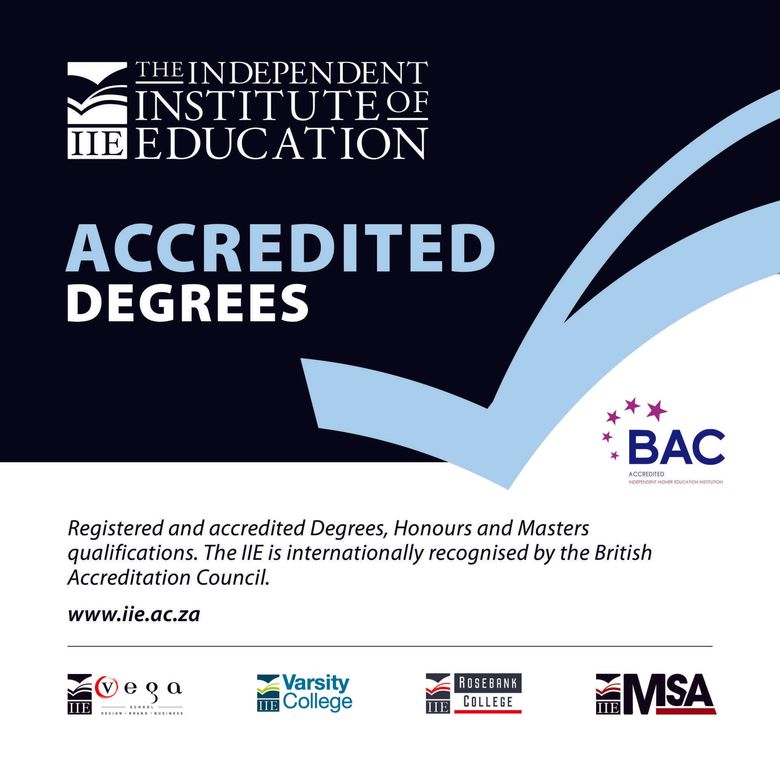MATRICS: 6 STEPS TO MAKING ONE OF YOUR MOST IMPORTANT DECISIONS EVER
The World of Work • February 6, 2018
As the Matric Class of 2018 settle into their final year of school and get to grips with the challenges of the year ahead, an education expert has warned that they need to start thinking about their plans for next year sooner rather than later.
"One of the most important decisions young people will ever need to take, is what they will study after school. Following closely on that one, is the decision about where to study," says Tammy Oppenheim, Head of Programme: Faculty of Humanities at The Independent Institute of Education, SA's largest and most accredited private higher education provider.
She says the options available in terms of institution, field and qualification today are so much wider than ever before. Despite this, prospective students often still don't investigate the full array of what is on offer, opting at the last minute for a traditional 3-year degree at a public institution.
"This is why we urge Matrics to start investigating and considering the pros and cons of various qualifications and institutions right away, so that when the time comes, they opt for the route which is most likely to see them succeed in a field which really excites them," she says.
Oppenheim says the process of narrowing down options should take into account:
1) FIELD OF STUDY
Offerings differ across and between public universities and private. Find an institution that specialises in your chosen field of work or that has a faculty or department with a significant reputation in the industry you have chosen. Studying with a niche institution if you are targeting a niche industry may be a smart way to show that you understand that industry. Do your research and ensure that you are choosing an accredited institution that has a good reputation in the field.
2) QUALIFICATION
Find the institution that offers a qualification that speaks directly to your ambitions. Qualifications are not always named after the field they are supporting, so you should look in some depth at the actual curriculum. This is easily available on most websites or from the institution.
3) AFFORDABILITY
Choosing an institution because it is conveniently located and is affordable makes sense. There are costs associated with studying beyond fees, and it would not make sense to have your dream scuppered because you can't sustain the cost of a residence or transport. Be realistic about what is achievable and give yourself breathing room to focus on your studies. That said, spend some time researching bursaries and payment options and do your math – a cost-benefit analysis of your study options will also help you make peace with whatever decision you make. An oft ignored fact is the graduation rate at an institution. If most students do not graduate in minimum time (three years for degrees for instance) then lower fees are not a real saving as you might need to pay for an extra year.
4) CULTURE
Many institutions have a long heritage and history. Maybe one of your parents is an alumnus at the university you always imagined attending. But remember that while tradition is important, it is more important for your future employability to find an institution that has kept pace with the changing requirements of the working world.
On the other hand, perhaps you know you need to study in a free and creative environment.
To determine the best fit for you, spend some time talking to past and current students at your earmarked institutions.
5) SIZE
Some institutions cater to tens of thousands of students. If you are introverted, find academics to be challenging, or have become used to smaller groups in your secondary education, then you should research your study options at smaller institutions. This option may be less overwhelming with a closer ratio of lecturers to students, which will likely lead to more individual attention and guidance that may be of benefit to you.
6) INTERESTS
If you are an avid athlete or have a niche hobby or interest, you may want to make sure that your studies are located in an environment that facilitates this. Just make sure that you are not basing your entire future on a sport or hobby alone. Remember that your hobbies and sporting interests can often be better met through clubs and leagues and that campus is not the only place to continue to participate.
"If you slowly start investigating your options rights away, you'll take a lot of stress off your shoulders in months to come," says Oppenheim.
"By being pro-active right off the bat, you'll be able to make an informed choice later in the year, about which qualification and which institution will best make your career dreams a reality in the shortest period of time. Before signing on the dotted line, you have to be sure that your chosen institution is credible, that your qualification prepares you for the demands of the modern world of work, and that it will support your long-term goals."
DID YOU KNOW?
The Independent Institute of Education (The IIE) is a division of the JSE-listed ADvTECH Group, Africa's largest private education provider. The IIE is the largest, most accredited registered private higher education institute in South Africa, and the only one accredited by The British Accreditation Council (BAC), the independent quality assurance authority that accredits private institutions in the UK. By law, private higher education institutions in South Africa may not call themselves Private Universities, although registered private institutions are subject to the same regulations, accreditation requirements and oversight as Public Universities.
The IIE has a history in education and training since 1909, and its brands - Rosebank College, Varsity College, The Business School at Varsity College and Vega - are widely recognised and respected for producing workplace-ready graduates, many of whom become industry-leaders in their chosen fields. The IIE offers a wide range of qualifications, from post-graduate degrees to short courses, on 20 registered higher education campuses across South Africa.












